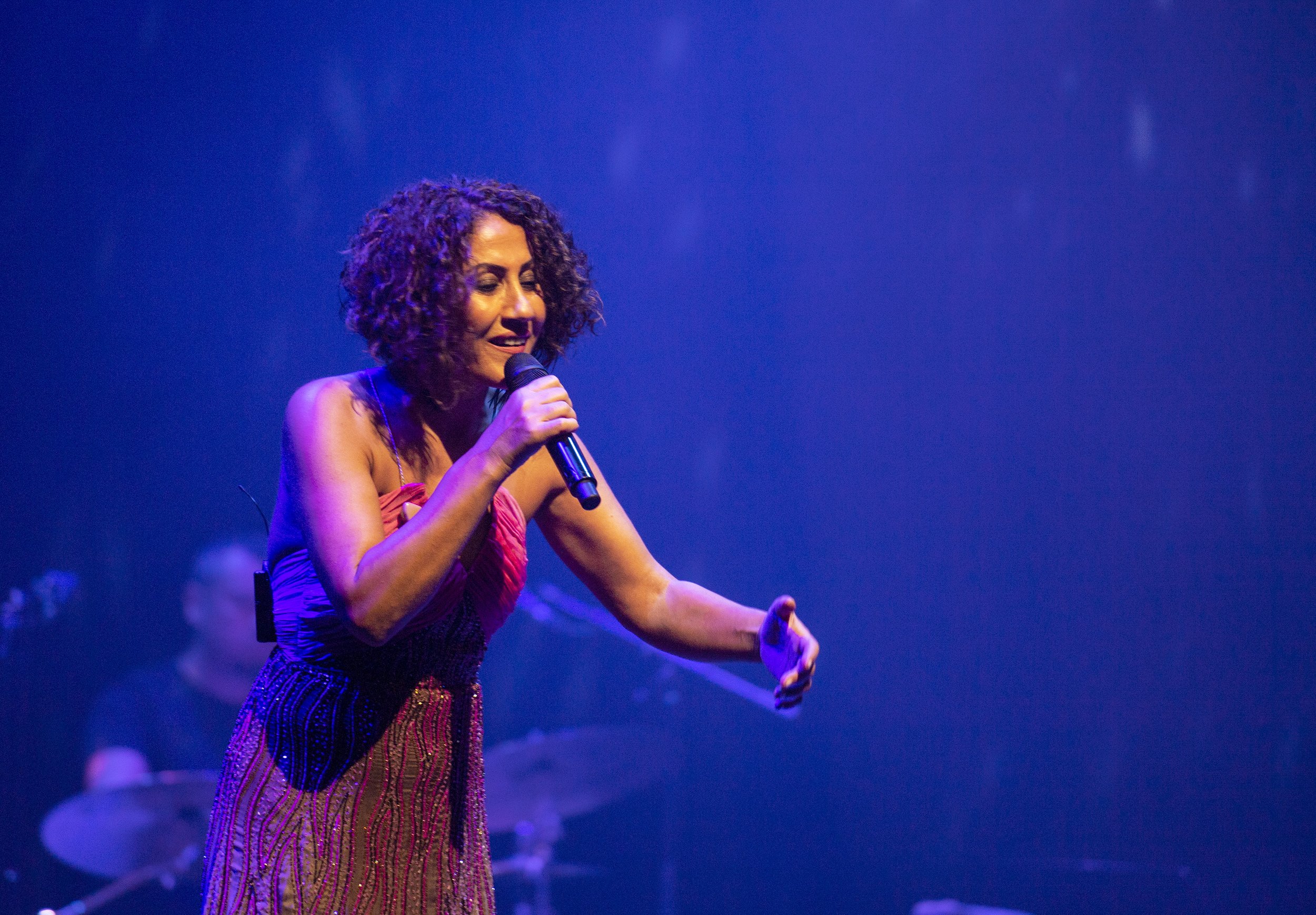Words by Justin Turford
Entering the Barbican Centre is a tricky affair. It is difficult to find from the train station (winding roads and overpowering, overdeveloped buildings everywhere) and getting inside the venue and finding everything from tickets, toilets and your seat is another level of hardcore orienteering. It’s quite incredible that they make you work so hard to access this stunning Brutalist temple of culture. However, once you are in, it is a spectacular place and for a space so epic in its scale and grandeur, this particular moment of the EFG London Jazz Festival would crystallise into what felt more like a triumphant family gathering than an intellectual exercise in jazz appreciation. A huge Kurdish turnout was assembled for their star. Having lived in London, I was very aware of the large Kurdish community and it really did appear that they were all here. It was a beautiful thing to see. From the extremely glamorous to the straight-from-work, multiple generations all congregated together for one of their own - Aynur Doğan. Known simply as Aynur, she is a Turkish-Kurdish singer of remarkable vocal and star power and is a much loved globe-travelling beacon of Kurdish culture in Turkey. I would put the audience as made up of at least 95% Kurdish / Turkish fans so I felt very privileged to be here. A feeling akin to being invited to a stranger’s wedding or birthday celebrations in a foreign country. A country of course, that the Kurds are denied.
Melisa Yıldırım by Justin Turford
The opening act, the surprisingly young award-winning kamancha (spiked fiddle) player and composer Melisa Yıldırım, had the difficult task of quieting down the bustling, excitable Aynur crowd and in the main, she achieved it bar a few annoying besuited ‘VIPs’ who seemed unaware of the restraint needed to really enjoy her intimate and powerful music. As with most things about this evening, I was a stranger. A stranger in this case, to the ancient sounding wonder of the melodies arching out of this violin-like instrument. Hypnotic maqam (the melodic system of Arabic classical music) melodies told me of folk tales and memories, resonant drones and attacked strings brought tension and majesty to her mesmerizing performance. Melisa, alone in the centre of that huge stage, filled it with her music and it was quietly spectacular.
After a short interlude, Aynur and her band took the stage and the electricity in the room went up several amps. The band positioned themselves in a wide semi-circle behind her - grand piano, stand up bass, drums, percussion, saxophone and G-Clarinet (‘Turkish clarinet’), and finally, the saz / bağlama (long-necked lute) player. Some of this music is hundreds of years old, folk songs, wedding songs and the like but transposed through a contemporary gaze. There is a jazz backbone here but jazz like the great Tunisian musician Dhafer Youseff explores. The old and the new in harmony, one never clashing with the other, long-loved melodies and stories enhanced and recoloured. Aynur’s voice ranges from the deep bluesy husk that she begins with to something that resembles jazz scatting to a soaring cry that fills every inch of this wooden panelled hall. With zero knowledge of the language, there is a freedom in just listening as her loose-limbed but precise band carry her supreme voice along. The grand piano was all sparkling orchestral runs and muted chords, the wind player sparing but perfectly timed as his haunting melodies supported and countered Aynur when required. The rhythm section was solid, muscular and explosive at times, but always respectful of the star instrument, Aynur’s evocative voice. The saz player brings the village to the stage. A beautiful sounding stringed instrument that accompanies music from all across the Ottoman Empire’s previous lands, it is handled with great sensitivity here. I wish that I could tell you what the songs were called and the names of the musicians in her band but I can’t. All that can be expressed is the magic in that room and there was plenty. Aynur herself prowled the grand stage with feline delicacy, the female counterpoint to the all-male band. Palpably moved by the audience response, she playfully interacted with the crowd and band alike, her grace in personality and voice a captivating presence. Whether alone with the saz or piano or at full tilt with the band, she clearly has that ‘it’ factor. A star. A star with humility but still a star.
PHOTO CREDIT: Tatiana Gorilovsky
As the gig heated up, members shouted for requests and exclaimed love in between songs and it was hugely moving when the subtle melodic murmurs from the crowd turned into full blown singalongs to some of the slower romantic pieces. Calling and answering enveloped the room and as the tempo of the music rose so did some of the audience. Only a few bravehearts took to their feet at first but by the triumphant end, the Barbican’s great hall was a bustle of waving arms, dancers with arms round waists and the piercing ululating trills of some of the younger women ringing out clear and bright and full of strength. My grin was hurting my face by this point and looking around at the ecstatic crowd around me, it was obvious that this was an evening to remember forever. Absolutely wonderful.
PHOTO CREDIT: Justin Turford





